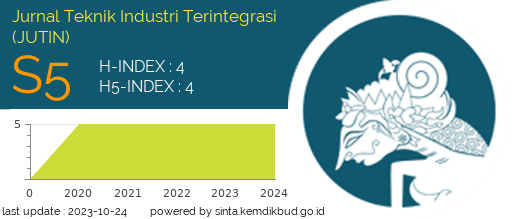Penerapan Algoritma K-Means untuk Pengelompokan Data Mahasiswa Baru Program Studi Teknik Informatika di Universitas Pahlawan Tuanku Tambusai
DOI:
https://doi.org/10.31004/jutin.v8i1.41449Keywords:
Data Mining, Clustering, K-Means, Informatics Engineering, Universitas Pahlawan Tuanku TambusaiAbstract
Pahlawan Tuanku Tambusai University (UP) in Riau Province has an Informatics Engineering Study Program that accepts new students every year from various regions around Bangkinang. Incoming student data is processed to assist decision making, especially in the field of promotion. This study aims to apply the K-Means algorithm to Informatics Engineering Study Program student data, with attributes of student name and district of origin, to group regions based on promotion potential. The K-Means method is used to group data into three clusters: High Priority, Medium Priority, and Low Priority. The results of the analysis show that there are 22 regions included in the High Priority Cluster, 23 regions in the Medium Priority Cluster, and 43 regions in the Low Priority Cluster. Regions in the High Priority Cluster are the main priority for promotion strategies, while regions in the Medium Priority and Low Priority Clusters require a more focused promotion approach. This study provides an important contribution to the promotion strategy of the Informatics Engineering Study Program at UP by using a data mining approach to increase the visibility of the study program in the communityReferences
Aswan, Y., Defit, S., & Nurcahyo, G. W. (2021). Algoritma K-Means Clustering dalam Mengklasifikasi Data Daerah Rawan Tindak Kriminalitas (Polres Kepulauan Mentawai). Jurnal Sistim Informasi Dan Teknologi, 3, 245–250. https://doi.org/10.37034/jsisfotek.v3i4.73
Fadhilaturrahmi, F., Erlinawati, E., & Ananda, R. (2020). Workshop Sinta 2 dan Google Schoolar di Universitas Pahlawan Tuanku Tambusai. Jurnal Abdidas, 1(4), 203–209. https://doi.org/10.31004/abdidas.v1i4.45
Hidayati, N., & Kasini, K. (2023). Classification of books at SMP YPK Pematang Siantar using the k-means clustering method. Jurnal Mantik, 7(2). http://iocscience.org/ejournal/index.php/mantik/article/view/3846%0Ahttp://iocscience.org/ejournal/index.php/mantik/article/download/3846/2825
Hidayati, N., & Rahmah, S. A. (2022). Clasterization Of Zeeida Product Sales Using K - Means Method In Medan Distributors. Jurnal Mantik, 6(36), 1685–1692. https://ejournal.iocscience.org/index.php/mantik/article/view/2545%0Ahttps://ejournal.iocscience.org/index.php/mantik/article/download/2545/2108
Nahjan, M. R., Nono Heryana, & Apriade Voutama. (2023). Implementasi Rapidminer Dengan Metode Clustering K-Means Untuk Analisa Penjualan Pada Toko Oj Cell. JATI (Jurnal Mahasiswa Teknik Informatika), 7(1), 101–104. https://doi.org/10.36040/jati.v7i1.6094
Noviyanto, N. (2020). Penerapan Data Mining dalam Mengelompokkan Jumlah Kematian Penderita COVID-19 Berdasarkan Negara di Benua Asia. Paradigma - Jurnal Komputer Dan Informatika, 22(2), 183–188. https://doi.org/10.31294/p.v22i2.8808
Okfalisa, Angraini, Novi, S., Rusnedy, H., Handayani, L., & Mustakim. (2021). Identification of the Distribution Village Maturation : Village Classification Using Density-Based Spatial Clustering of Application with Noise. Jurnal Teknologi Dan Sistem Komputer, Apr. https://doi.org/https://doi.org/10.14710/jtsiskom.2021.13998
Pattipeilohy, R. L., & Pakereng, M. A. I. (2023). Penerapan K-Means Clustering Pada Data Mahasiswa Fakultas Interdisiplin Program Studi D4 Destinasi Pariwisata Untuk Menentukan Strategi Promosi. Jurnal Sains Komputer & Informatika (J-SAKTI, 7(1), 320–331.
Rahmalinda, N. A., & Jananto, A. (2022). Penerapan Metode K-Means Clustering Dalam Menentukan Strategi Promosi Berdasarkan Data Penerimaan Mahasiswa Baru. Jurnal Tekno Kompak, 16(2), 163. https://doi.org/10.33365/jtk.v16i2.1971
Rahmayani, M. T. I., & Hidayati, N. (2022). Implemention K-Means Algorithm Determine the Recovery Rate Of Covid-19 Patients In Indonesia. Jurnal Mantik, 6(36), 127–135. http://iocscience.org/ejournal/index.php/mantik/article/view/2059%0Ahttps://iocscience.org/ejournal/index.php/mantik/article/download/2059/1754
Rusnedy, H., Nurcahyo, G. W., & Sumijan, S. (2021). Identifikasi Tingkat Pemakaian Obat Menggunakan Metode Fuzzy C-Means. Jurnal Informasi Dan Teknologi, 3, 196–201. https://doi.org/10.37034/jidt.v3i4.152
Downloads
Published
How to Cite
Issue
Section
License
Copyright (c) 2025 Hidayati Rusnedy, Kasini Kasini, Lailatul Syifa Tanjung, Novi Yona Sidratul Munti

This work is licensed under a Creative Commons Attribution-ShareAlike 4.0 International License.


